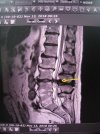I'm a retired orthopedic surgeon and would advise people to take with a grain of salt any advice that someone gives based just on their own personal experience. Personal experience compared to what? The natural history of back pain in general is for it to resolve on its own regardless of "therapy" including drugs, surgery, PT and dozens of other methods. "Eighty percent of medicine is to keep the patient entertained while the disease runs its natural course" is an age-old quip which in my opinion contains a lot of truth. The fact is, most of the time the actual physiologic cause of the back pain isn't known despite the diagnosis that the patient hears or that appears on the medical record. There are probably a number of different etiologies with no objective way to detect them, and things like "bulging discs", "torn muscles", "low back strain", "lumbago" and others are usually difficult if not impossible to prove with any reliable test.
When CAT scans were first utilized, I recall a study that found that something in the range of 65% of patients with NO SYMPTOMS who had volunteered for the test were found by the radiologist to have abnormal findings on the test. That means that in a large number of patient WITH SYMPTOMS will have those same or very similar results, but that doesn't mean that the abnormalities necessarily have anything to do with causation, although it's typically assumed that it does.
I did spinal deformity surgery but did not do surgery for back pain unless there was clear and very convincing evidence of a very specific cause, and that was fairly rare. I ultimately stopped scheduling back pain patients in the office, referring them instead to a level-headed surgeon specialist with a good management track record which could include surgery but usually didn't.
So my general advice for acute back pain (that isn't shooting down into the lower leg) is simply to stop doing anything that hurts until the pain subsides, and be patient while it does so. Gentle stretching helps as the pain level reduces and once comfortable, conditioning can and does help prevent future episodes. Stay away from narcotics except maybe in the first day or two. Don't rush into "treatment" for something that is likely to resolve with or without it, and don't be shy about asking doctors what they do for their own back pain. You are likely to be surprised.



